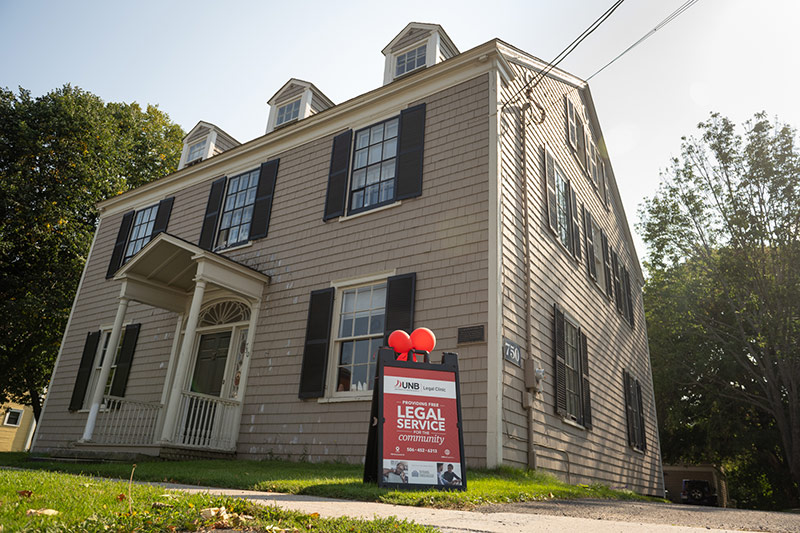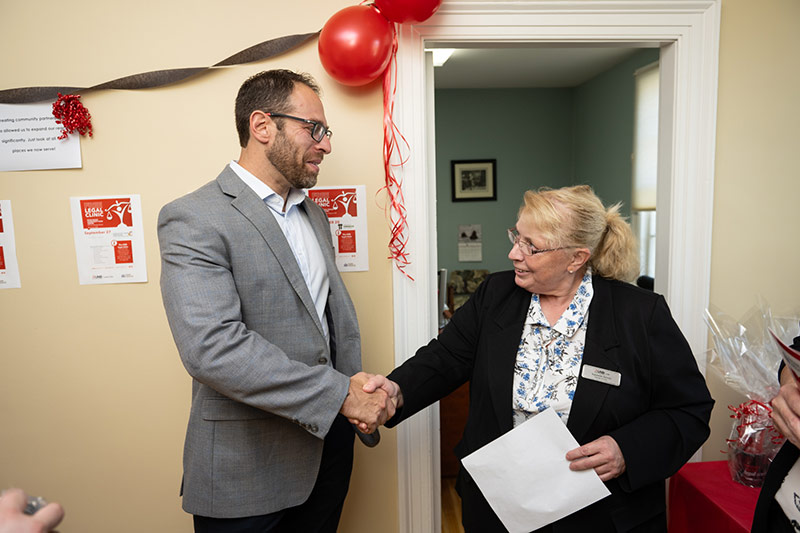UNB Legal Clinic’s mobile services hit the road
Author: Tim Jaques
Posted on Oct 9, 2024
Category: UNB Fredericton

The University of New Brunswick’s (UNB) Legal Clinic is driving access to justice with expanded mobile clinics–an initiative to provide legal aid to rural and underserved populations.
Clinic director Jeannette Savoie said the expansion has been a critical step toward addressing underserved legal needs.
“These clinics fill a crucial gap, as many areas of New Brunswick lack adequate legal services,” she said.
The clinic is based at 750 Brunswick St. in Fredericton. Third-year law students staff it as part of a 15-credit course. There are currently four student clinicians.
“They are here like it is a full-time job,” said Savoie.
Dean of law Michael Marin, KC, said turning the clinic’s operation into a full-term course was a significant change.
“This means student clinicians are fully immersed in the clinic for a whole term, allowing them to dedicate their energy and focus entirely to this vital work,” he said.
“As a result, we have been able to expand our reach beyond Fredericton, launching mobile clinics throughout the province to provide legal representation to even more people in need.
“This change not only enhances the students’ experience but also strengthens our ability to serve the community.”
Student clinicians undergo a two-week orientation, conducting mock interviews, observing court proceedings and learning to apply substantive law to a problem.
Lawyer Ben Whitney (BBA'13, C-ETH'15, JD'17) oversees them, ensuring they have support without micromanagement.
“Direct supervision doesn’t mean someone always looks over your shoulder,” Savoie said.
The students sometimes work with clients who face language and cultural barriers. The clinic collaborates with multicultural associations and interpreters to ensure clients from diverse linguistic backgrounds, including Arabic, Farsi, Mandarin and French, receive adequate translation.
The clinic recently received substantial funding from the New Brunswick Law Foundation to ensure its continuation. It handles cases involving tenancy disputes, small claims, human rights, employment law, social benefits, provincial offences and some immigration matters.
The clinic does not handle Criminal Code offences.
All UNB students qualify for assistance. Others must qualify financially.
“We are here to help. People should have a right to representation,” Savoie said.
“We have seen clients from Saint John and Kingsclear First Nation (Bilijk), and we’re working to expand into Miramichi and Moncton,” Savoie said.
“In Miramichi, an elderly gentleman who was homebound needed to get documents prepared. We went with the students and accommodated him,” she said.
Mobile clinics are not held exclusively in small communities. Some are held at the Saint John Newcomers Centre, aimed mainly at those who are new to Canada.
“The legal clinic makes a difference when people are getting evicted, get terminated from their employment, or having difficulty with social development because they don’t know the rules in Canada,” Savoie said.
Savoie said the clinic supports organizations that have applied for federal funding as part of their information and advocacy programs. If these applications are successful, the clinic will provide free mobile clinics in northern New Brunswick for those seeking residential tenant advice. This initiative would require both day trips and overnight stays.
“One of the greatest challenges with mobile clinics is finding a place to hold the clinic and getting all the advertising and promotion done locally. This requires developing sound partnerships where someone can promote the program on our behalf.”

Student clinicians gain invaluable real-world experience. Third-year law student Anil Gill, who worked at the clinic during the summer, found it transformative.
“I was given the best experience in my life. I have learned so much practical knowledge. In school, you learn academic stuff, baselines and foundations. But it was cool to see the practical aspect of it all,” Gill said.
Gill recalled the clinic’s weekly presence at Wilmot United Church in downtown Fredericton during the church’s meal program.
“We called them ‘Wilmot Wednesdays,’ and we spoke with many guests during our weekly visits. It was clear that many had issues for which we could provide unique support,” he said.
Lauren Kielbowich, a third-year student working at the clinic this term, likes making a difference.
“I’ve always been interested in supporting the community that I live in, whether that be through volunteering, work or school,” Kielbowich said.
“Having this experiential learning and being able to assist not just the Fredericton community but the New Brunswick community with a set of skills I’ve learned through UNB law is a great opportunity.”
Since its inception in 2022, the clinic has served over 600 clients. Its success has benefited individuals needing legal assistance and drawn interest from lawyers willing to help if the matter becomes too complex.
“We have had successful decisions for people, but it has opened a door where lawyers are now asking how they can help,” Savoie said.
Savoie would like to acquire a vehicle in which clinics could be held. This would reduce the need to rent spaces or rely on local resources, streamlining the process of bringing legal services to the people who need them most.
“Our goal will be to have the means and resources to do clinics, be mobile and meet the people where they are,” Savoie said.
Students gain practical skills, and the experience opens their eyes to the broader social and economic challenges many clients face.
“Some students may not have been aware of how bad certain situations were, and then after working at the clinic, they realize they live a privileged lifestyle compared to what some people are going through,” Savoie said.
